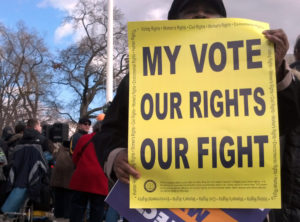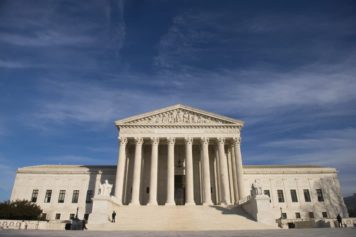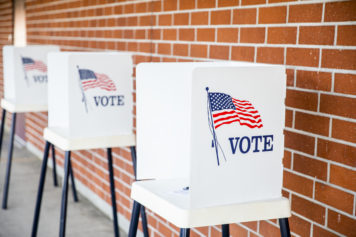The North Carolina primaries are next month, but recent news report show that there are still legal battles over the election process in the state.
A recently concluded lawsuit has challenged North Carolina’s voter ID law, which is one of the strictest in the nation. The News & Observer said a federal court ruled Friday that 13 congressional districts must be redrawn within two weeks. The court said the districts had been gerrymandered to dilute Black voting power.
The Rev. William Barber heads the North Carolina NAACP chapter, which has been involved in several lawsuits over voting rights.
“This ruling by all three judges is a vindication of our challenge to the General Assembly of North Carolina writing racially biased ‘apartheid’ voting districts to disenfranchise the power of the African-American vote,” Barber said.
The recent ruling could affect a separate NAACP suit which has called for the invalidation of the North Carolina legislature’s 2011 redistricting, Barber said.
Bob Phillips, executive director of Common Cause North Carolina, said North Carolina needs to adopt a redistricting system that is nonpartisan.
“For years, partisan gerrymandering has led to costly litigation and deprived North Carolina voters of having a real choice and a voice in our elections,” Phillips said. “Fortunately, a growing number of citizens and leaders across the political spectrum agree that North Carolina should adopt an independent redistricting process.”
The Los Angeles Times said North Carolinians are waiting on a ruling by U.S. District Judge Thomas Schroeder on a lawsuit challenging North Carolina’s strict voter ID law. The law states that state residents must show a government-issued ID to vote and the ID must exactly match their voter registration. A lawsuit filed by the NAACP accused the law of making it difficult for Black and Latino residents to vote.
State Republicans have said voter ID laws are necessary to protect against voter fraud. But cases of voter fraud are very rare. The Los Angeles Times said Lorraine Minnite, an associate professor of public policy at Rutgers University who testified at the trial, found only two cases of voter impersonation among 35 million ballots cast between 2000 to 2014.
“Their claims of fraud were fraudulent in and of themselves,” said Barber in a phone interview with The LA Times. “It’s a very smooth way of trying to continue to hold on to the ‘solid South’ through election and voter suppression and trickery.”
Rosanell Eaton, a 94-year-old North Carolina resident, was a plaintiff in the voter ID lawsuit. She talked about the difficulty she had obtaining a government-issued ID that would enable her to vote. She would have been barred from voting because the name on her driver’s license is not an exact match to the name on her voter registration card. Eaton drove 200 miles and made 10 trips to the DMV trying to correct her ID.
“It’s going to be difficult, they [black voters] may get discouraged, and they don’t have the money to pay people to wait all day. It’s just a lot of headache in it,” she said during court testimony.
Several voter ID laws were enacted across the country after a 2013 Supreme Court ruling struck down parts of the 1965 Voting Rights Act. Chief Justice John Roberts said the Voting Rights Act was no longer necessary because racism was a thing of the past.



